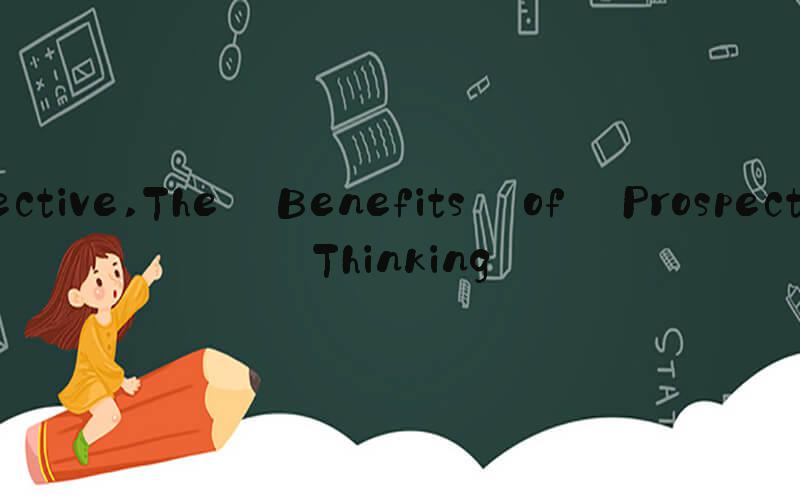
Prospective: Looking Ahead to the Future
Prospective is a word that is closely associated with the future. It is a way of examining possibilities and imagining what could be. The concept of prospective thinking is essential in planning and decision-making, whether it be personal or business-related. In this article, we will explore the importance of prospective thinking and how it can benefit individuals and organizations.
The Benefits of Prospective Thinking
Prospective thinking allows individuals and organizations to anticipate potential obstacles and plan accordingly. By thinking ahead, we can identify potential issues and develop strategies to mitigate or avoid them altogether. For example, a prospective thinker who is planning a trip would consider factors like weather, traffic, and transportation to ensure a smooth journey.
Another benefit of prospective thinking is that it encourages individuals and organizations to stay ahead of the curve. By keeping an eye on market trends, technological advancements, and industry changes, they can anticipate the future and develop products and services that are ahead of the competition. This approach ensures that they remain relevant and successful in the long term.
The Drawbacks of Failing to Think Prospectively
On the other hand, failing to think prospectively can have significant consequences. Individuals and organizations that don't consider the future may find themselves unprepared for unexpected events. They may miss opportunities or be caught off guard by changes in the industry or the economy. Such events can be devastating to their bottom line, reputation, and overall success.
For example, a company that fails to anticipate the growing demand for eco-friendly products may see a decline in sales as consumers shift towards environmentally-conscious alternatives. Similarly, an individual who neglects to plan for their retirement may face financial challenges in their later years.
The Role of Prospective Thinking in Personal Development
Prospective thinking also plays an essential role in personal development. By thinking ahead, individuals can set long-term goals and develop strategies to achieve them. They can identify their strengths and weaknesses and work on self-improvement. For example, an individual who wishes to learn a new language may set a long-term goal of becoming fluent and develop a plan to achieve it.
Prospective thinking can also help individuals make well-informed choices. By considering the outcomes of different choices, they can choose the best course of action that aligns with their long-term goals. For example, a person who is offered two job opportunities may consider the long-term benefits and drawbacks of each position before making a decision.
The Role of Prospective Thinking in Business Development
Prospective thinking is equally important in business development. It allows organizations to stay ahead of the competition and adapt to changes in the market. By anticipating the future, they can develop long-term strategies and set achievable goals that align with their vision and values.
Prospective thinking also encourages innovation and creativity. By looking ahead, organizations can identify areas that need improvement and develop products and services that meet the evolving needs of their customers. For example, a company that specializes in online retail may identify the growing demand for faster delivery times and develop a new logistics strategy to meet this need.
In Conclusion
Prospective thinking is an essential tool for personal and business development. By looking ahead, individuals and organizations can anticipate potential issues, stay ahead of the curve, and make well-informed choices. Failure to think prospectively can lead to missed opportunities, unexpected obstacles, and a lack of preparedness for the future. Therefore, it is crucial to develop prospective thinking skills and apply them to every aspect of our lives.

